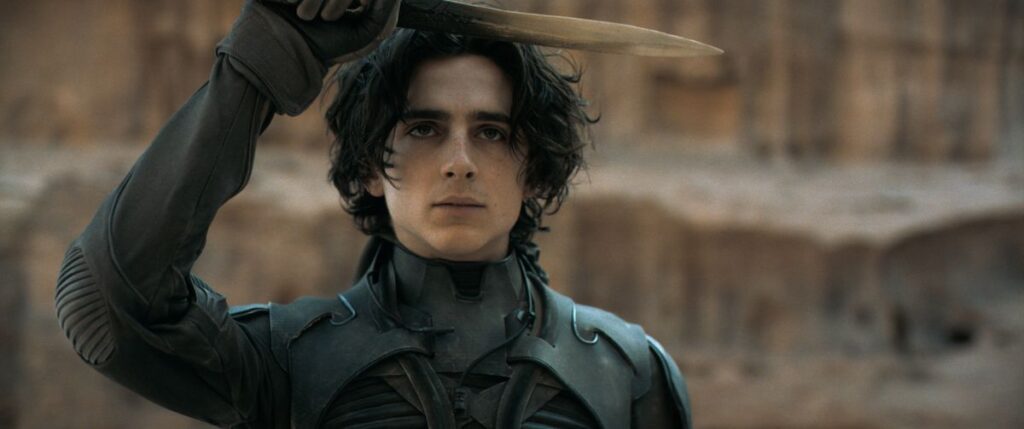Much like the mystical religions spread by its Bene Gesserit, the influences of Dune spread to every corner of the universe of science fiction. In some stories, the inspirations are woven so tightly into the fabric of the story they’re nearly impossible to pick up, maybe even for the author themself. In others, the homages to Dune are unmissable, occasionally to the point of being distracting. And then there’s Star Wars, the most blatant ripoff of all — at least, according to Frank Herbert.
The Dune author didn’t talk much about George Lucas’ landmark science fiction film before his death in 1986, but he answered a few questions about it over the years, and he always seemed at least a little annoyed at the similarities between the two stories.
The first public comments he seems to have made about the movie come from an interview with the Associated Press from 1977, the year A New Hope was released. The article is pretty straightforward shit-stirring, but it’s clear that while Herbert hadn’t yet seen the movie, he did have some thoughts about its similarities to his seminal series, which was already three books in.
Herbert starts by saying an editor for the Village Voice had called him and asked if he had seen Star Wars, and whether or not he was going to sue. It’s a strong lead-in, but apparently that’s what was top of mind of Herbert.
“I will try hard not to sue,” Herbert told the Associated Press. “I have no idea what book of mine it fits, but I suspect it may be Dune since in that I had a Princess Alia and the movie has a Princess Leia. And I hear there is a sandworm carcass and hood dwellers in the desert, just like in Dune.”
Herbert goes on to brag, rightfully, about the ubiquity of Dune, both in popular culture and even as a college textbook on subjects like “architecture, psychology, writing, English, human living, space analysis, and some I’ve forgotten.” Herbert doesn’t get too specific in this early article, but it’s clear the movie’s reported similarities to his own work didn’t sit quite right with him. And later it would be even clearer that they stuck in his craw, one way or another.
Image: Warner Bros. Pictures
Now, with decades of hindsight and years of interviews, it’s easy to see that Star Wars, particularly the first film, is an amalgamation of many genres and stories, including (but not limited to) science fiction, mythical fantasy, and the samurai movies of Akira Kurosawa. There’s also an entire expanded universe of history in the Star Wars galaxy that borrows from all over the sci-fi canon, and has helped inspire just as many future writers.
But if you consider the time when Star Wars was just one tremendously successful summer blockbuster, it’s easy to understand why Herbert might have had a bone to pick. And as the years went by, it’s clear that he thought quite a bit about the subject, enough to count the similarities between the titles.
“Lucas has never admitted that they copied a lot of Dune, and I’m not saying they did,” Herbert said in 1985, during a speaking engagement at UCLA. “I’m just saying there are 16 points of identity between the book Dune and Star Wars. Now you’ve had stat — what is it? It’s 16 times 16 times 16 times… over 1, the odds against that being coincidence? There aren’t that many stars in the universe.”
Herbert’s frustrated quote stemmed from a question about whether or not Lucas ever bought Herbert dinner — a reference to a long-standing joke of Herbert’s that even if Lucas didn’t blatantly steal his ideas to make Star Wars, he at least owes Herbert dinner for the coincidence.
But Frank Herbert was one to lose out on a war of pettiness. A year before that UCLA interview, he published Heretics of Dune, the fifth book in the series and the second to last written by him. Late in the book, which is mostly about the future of humanity after the death of The God Emperor, Herbert has a small, inconspicuous passage that certainly feels like a reference to Star Wars. He doesn’t seem to have ever said that officially, so we’ll let you judge:
In the time of the Old Empire and even under the reign of Maud’Dib, the region around the Gammu Keep had been a forest reserve, high ground rising well above the oily residue that tended to cover Harkonnen land. On this ground, the Harkonnens had grown some of the finest pilingitam, a wood of steady currency, always valued by the supremely rich. From the most ancient times, the knowledgeable had preferred to surround themselves with fine woods rather than with the mass-produced artificial materials known then as polestine, polaz, and pormabat (latterly: tine, laz, and bat). As far back as the Old Empire there had been a pejorative label for the small rich and Families Minor arising from the knowledge of the rare wood’s value.
“He’s a three P-O,” they said, meaning that such a person surrounded himself with cheap copies made from déclassé substances.

